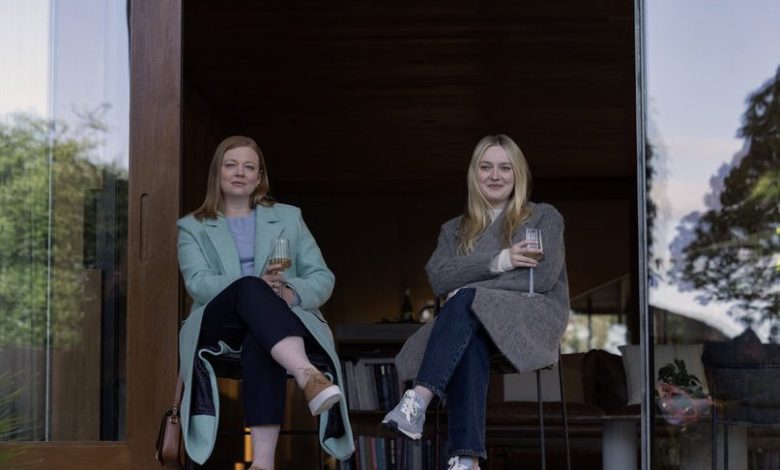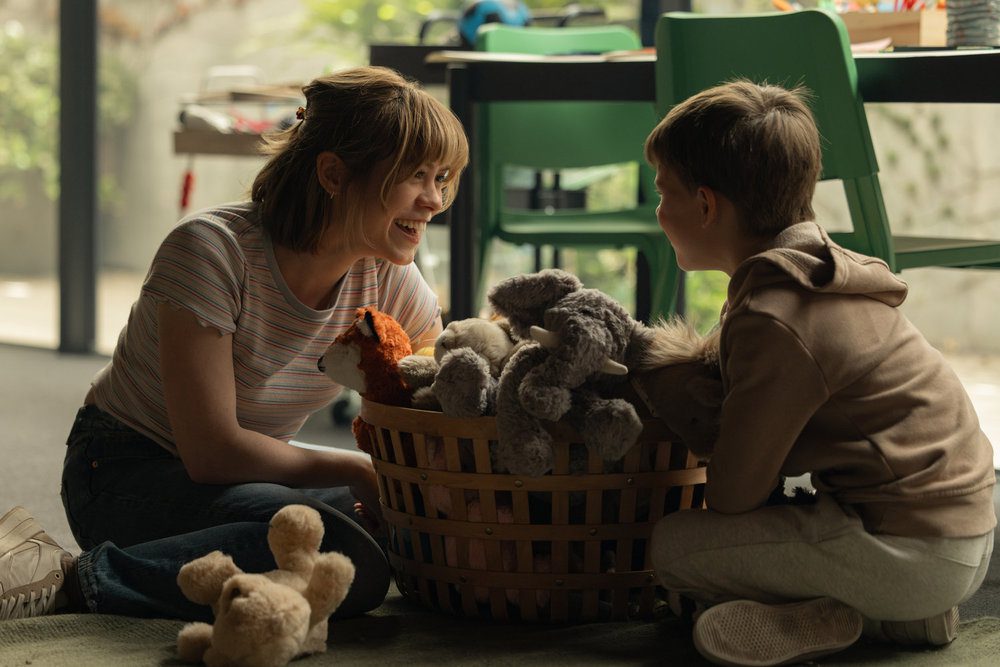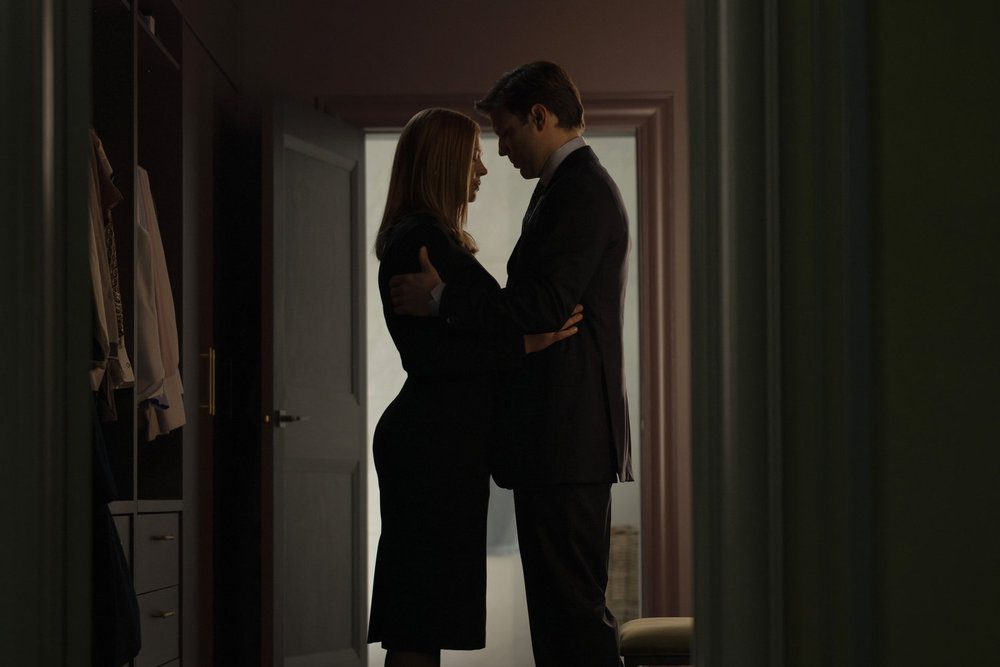Is That Really the End of ‘All Her Fault’? Sarah Snook and Showrunner Weigh In After Twisty Ending

[This story contains major spoilers from the finale of All Her Fault.]
Not having to guess the ending (or endings) to Peacock’s buzzy Sarah Snook-led series All Her Fault hasn’t erased any questions. A parent’s worst nightmare — of their child, a 5-year-old, being taken — as viewers discovered, is only one of the Peacock psychological thriller’s many twisty layers.
And its those layers that convinced executive producer and Carnival Films managing partner Nigel Marchant, whose credits include Downton Abbey and The Day of the Jackal, to scoop up Irish author Andrea Mara’s homonymous bestseller for Megan Gallagher to adapt on the small screen.
In “a good drama, you want the twists and turns, but part of our job is also to hold up a mirror to society,” Marchant explained to The Hollywood Reporter. Gallagher, says Marchant, “really helped cement some of those twists and turns” as well as capture the underlining themes “about the inequality of domestic labor in straight married couples where mothers have to be the CEO both at home and in the office, [as well as] how women in these circumstances face a harsher sense of scrutiny than men.”
There was never a question that Snook, who has an Emmy for her role as Shiv Roy in HBO hit Succession and a Tony for her Broadway debut in The Picture of Dorian Gray (where she played 26 characters), could inhabit lead character Marissa’s many emotions to anchor the series, which also stars Michael Peña, Jay Ellis, Abby Elliott and Emmy nominees Jake Lacy and Dakota Fanning.
Snook’s presence, Fanning shared, drew her to the role of Jenny Kaminski, mother to Jacob (Tayden Jax Ryan), Marissa’s son Milo’s (Duke McCloud) intended playmate. “I was excited at the opportunity to work with Sarah as such a fan of hers,” she shared. “I knew most of my scenes would be with her and that our relationship would be at the center of a lot of the story.”
Who and what Jenny represents also enticed Fanning: “There were things in Jenny that everyone could kind of see themselves in. Even if they don’t have kids yet or aren’t married, they can see the struggles she’s going through of just trying to be everything to everyone.”
Considering Jenny’s nanny Carrie (a breakout role for Sophia Lillis) is, as viewers ultimately discover, the one who took Milo, the two mothers evolving into supportive friends is not the typical direction for these characters. “You might expect it to go down in flames and become the pointing fingers thing,” noted Fanning. “We flipped that on its head and said, ‘No, these two are going to be friends, and they’re going to help each other through this. They’re going to lean on one another and learn things from one another.’”
In the spirit of learning some of the whys behind the key moments of All Her Fault, The Hollywood Reporter questioned Snook and Gallagher — who, outside of their main roles as actor and showrunner, also serve as executive producers of the series — and asked if this is really the end and a limited series adaptation, or if a second season could be in the cards.
***
Let’s talk about the ending and Milo actually being Carrie’s (Sophia Lillis) son, whose real name is Josephine.
SARAH SNOOK One of the hardest things with a story with as many twists and turns and size of the plot [here] is that you have to be a dean of the details. You have to make sure who knows what piece of information when. Does the audience really understand this is Josephine instead of Carrie? All the pieces that fit together, and the timing of that information coming out, has to work together and work well. Megan, as you know, was hugely instrumental — obviously, because she’s a writer — in creating and passing it out. For me as an actor, it’s a joy to work on scenes where you have multiple characters all with slightly different information, who are all finding out new information together. Those revelation scenes are amazing to act out.
Was that element something that really captivated you about Andrea Mara’s novel when you were adapting it, Megan?
MEGAN GALLAGHER Absolutely. So often thrillers live and die by their endings. So many of them hook you in and are interesting, and then start treading water and peter out. But Andrea’s novel is such a whopper of an ending. She really swung for the fences and did an incredible job. So it was so fun and reassuring, because, as Sarah points out, it’s a complex show with lots of twists and turns. It’s so helpful to have such a big North star that you’re writing towards, and grounding to the whole process. It was an incredible ending that I’m so grateful to have inherited from her.
You could say there are several endings — like the reveal of the car accident, Carrie’s true identity, even Peter’s (Jake Lacy) role in his siblings Lia (Abby Elliott) and Brian’s dysfunction. You can’t see a lot of this coming. Sarah, can you talk about creating those dynamics with Jake Lacy who plays Peter, because, in the beginning, the audience has to really be sold that Marissa is absolutely all-in with her marriage to Jake for the series and its ending, or endings, to work.
SNOOK We didn’t have a lot of moments to show the audience the time before Milo disappears, before this chaotic event. And part of that is that it’s trickier to create a character when you’re right in the madness and chaos, because you want to see who they are in the quiet times. And, how did they get together in the first place? It’s fortunate that Jake and I get along really well together and make each other laugh. We had the scene where she’s organizing the dentist appointment or on the beach to show how they get along beforehand. There are a few other little bits and pieces. But you’re right, there is a growth for Marissa to go from a woman who is happy in her marriage and seems to have it all, to then having the veil lifted as to who her husband really is and to the extent to which he actually does need control pervasively. It’s not just control over the little pieces that happen to be a quirk of his personality; this is a deep, fundamental, problematic, flawed need for control.

Talk about Sophia’s performance as Carrie, Josephine. She just captures so much.
GALLAGHER We’re so grateful to have Sophia in this. She’s amazing. As an actor, she took a leap of faith on us and of me, because she signed on before I had written episode seven. God bless her for that, and I’m very grateful to have her from a writing perspective. Her performance is amazing; Sarah can talk about sharing the screen with her. But I’m a big believer that we could write eight episodes legitimately [about any character in this story]. We could do an eight-episode series about Peter or Brian or Lia or Colin and his issue. But you could absolutely write an eight-episode series about what happens to Josephine throughout her life and the lengths she goes to do what she did. It was so nice to write a whole episode where we completely break away from everything else we’ve been following and just go with her and learn who she is. It was an absolute pleasure to write that episode; it falls at exactly the right time and forms that finale.
SNOOK Working with her is incredible. She’s so available [to] experience things; so present and listening. It was amazing to work with her. This is the first time I’ve worked with her, and I can’t wait to see what she does next. She’s got a huge career.
One thing really interesting about All Her Fault is the social commentary about how even when you’re a married, working woman, you can be a single parent. Like the men are just not helping enough.
SNOOK Yeah. It often falls to the woman in the relationship to pick up the invisible load — the mental load and invisible labor — because, if she doesn’t, then it doesn’t get done. There’s a lesson in the character of Jenny actually speaking up for it, articulating and vocalizing your needs that can be met, or the relationship could not continue. But allowing something to get as bad as it does, particularly in the Richie-Jenny relationship, is [the result of] both sides not speaking up, and one side being oblivious and allowing that to happen, and the other side just not speaking up. So maybe, hopefully, this might encourage people to speak up a little more.
GALLAGHER I always say that, first and foremost, I want this to be entertaining. It’s a thriller and is absolutely rooted in that, but I hope this sparks a conversation about what women are going through. Every woman I know between the ages of 30 and 55 is breaking down in tears outside the school gates, thinking, “How is it going to get done and how am I going to do it all?” This feels like such a massive, real, true issue that’s going on with every woman who works and has children; the balance doesn’t feel fair. I’ve seen it touched upon in television, but I haven’t seen it dug into very deeply. It just feels like we’re not serving women, so it was exciting to dig into it for eight episodes.
The camaraderie between Marissa and Jenny as working women and mothers, even in this horrifying crisis, is also interesting because, in other productions, they would have been at odds.
SNOOK I like it as a departure from what the norm would be. Marissa is more likely to, in another story, bring charges against Jenny and try and find someone to house all her frustrations, fears, horror, grief; all of that could be lumped upon Jenny in a callous and retaliatory way. But Jenny is still the house for all of that. Lumbered with all that grief, she is sharing the load with Marissa. And their sharing it together is much more empowering in the strength gained from having a friendship like that rather than using it, in a storytelling sense, to be the source of conflict.
GALLAGHER We always wrote this from a perspective of Marissa having every reason in the world, on paper, to hate Jenny. Because she’s hired this nanny, and now her child’s gone. Jenny has every reason in the world to never go over to the Irvine home, to hide in shame and be fearful of a lawsuit. I know so many women in my life who would be like Marissa and would instantly forgive, and so many women in my life who would be like Jenny who was strong enough to show up at that house. So it didn’t feel unrealistic to me. It felt like the female friends I have. I think it’s a completely honest way of depicting women and how they interact with each other.

Michael Peña’s character Detective Alcaras is filled with so much empathy. It feels like a very different portrait than we’re used to seeing of law enforcement. How does him caring for a special needs child, and the emotional intelligence that takes, feed into how he handles his job.
GALLAGHER It was a deeply personal storyline to me. I have a child with special needs and, in a show that is on the whole quite critical of men and their roles domestically, I did feel it was important to point out that there are men out there who do do it, and do it beautifully. My husband happens to be one of them. It felt like the right thing to show how a household could be a source of nothing but stress and sorrow, but when everybody shows up and loves each other and pulls equal weight, it can be a beautiful home. And it really is a beautiful home. There are beautiful scenes and a happy marriage and good people. It felt important to put that on screen.
Michael Peña was the only actor I wanted for the role. I wrote him a letter, putting my heart on my sleeve about how this is basically about my son, and you’re the only one I want; please do it. About a week later, I was on the phone with him. I’m still pinching myself that he agreed to do that, and he did it really, really beautifully.
On the flip side, Marissa is going through a lot of betrayal, and Colin’s betrayal kind of comes out of nowhere. There’s so much going on with gambling, corruption. Talk about that heartbreak from Colin for Marissa.
SNOOK Obviously, there’s going to be a little bit of a red herring for audiences; that’s part of the thriller element. Maybe there’s a [romantic] history here; what’s the connection? It was great to be able to show a platonic male-female friendship on screen that we don’t see so much of, and reflect my own friendships in life. I have a lot of male friends who are my platonic best mates. They’re a great source of strength for me, and being able to explore that with Jay … he has a history that unfolds within and I love how it adds to the thriller element.
GALLAGHER I feel the same way. I have lots of male friends, and they’ve continued to be my male friends. Even after being married, they’ve strengthened. We don’t see it on screen enough. It’s always that they’ve got a romantic past, or that’s where they go, and it just feels old-fashioned to me at this point.
Nigel Marchant said All Her Fault is one and done, but given what we know Marissa knows about Milo, even with Peter’s tragic allergic “death,” there could be an opening for another installment. What do you think? And what might that look like?
SNOOK I don’t know. [The show’s] attractive[ness] in a lot of ways is that it’s a limited series. You come in at such a high-tension moment, and then when you leave, it seems resolved. But there is always going to be questions: How does Milo grow up in this new dynamic? When does he learn the information about his past and his parents and his true history? How does Marissa deal with that? There are no plans I’m aware of that we’re going to do a second part. As Megan said about each of the characters, you could create an eight-part series on each of them. You want to see where Peter began. Why is he like that? You want to see it with Brian and Lia. Good stories can proliferate and create more.
GALLAGHER I think everyone right now is focused on the excitement behind season one. But from a purely selfish standpoint, I would never get tired of swimming around that well.
***
All eight episodes of All Her Fault are currently streaming on Peacock.
HiCelebNews online magazine publishes interesting content every day in the TV section of the entertainment category. Follow us to read the latest news.





